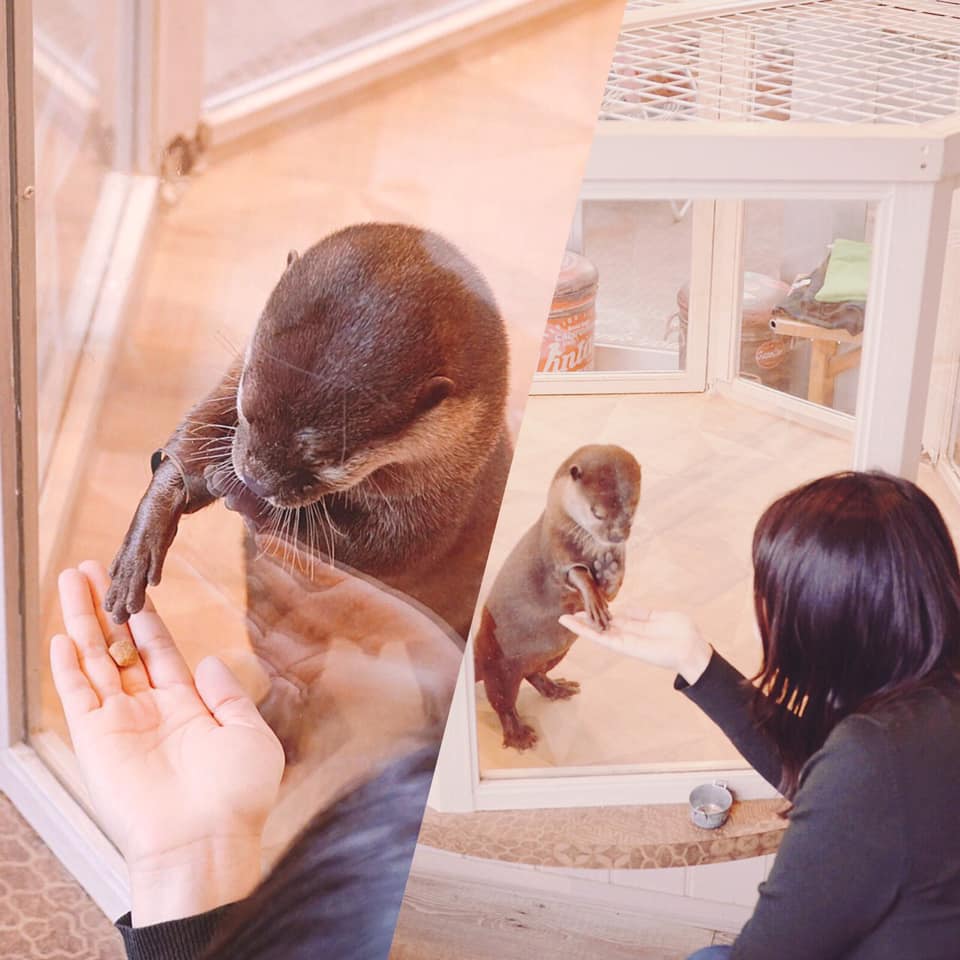Otters are well-loved by many for their furry bodies, chubby faces and stumpy legs.
But their rising popularity could be the undoing of wild otter populations in Southeast Asia.
Cute and exotic?
Japan is well-known for their numerous exotic pet cafes lining the streets, harbouring not just cats and dogs, but owls, raccoons and hedgehogs.
With the country's penchant for all things cute, otters are now the latest trend, both as pets and in cafes.
Otter cafes draw in large numbers of tourists, both foreigners and locals, keen to interact with the creatures up-close instead of viewing them from afar in the wild or at zoos and reserves.
 *Disclaimer: It is not known where this cafe procures their otters from, or if they sell the otters* Photo from เรา เปลี่ยน ไป - wechangeto, Facebook
*Disclaimer: It is not known where this cafe procures their otters from, or if they sell the otters* Photo from เรา เปลี่ยน ไป - wechangeto, Facebook
According to New York Times, some cafes are willing to sell their otters to interested buyers, albeit at a hefty price.
Otters likely smuggled into Japan
Traffic Japan, a non-profit that monitors the illegal wildlife trade, said most cafe owners claim their otters were captive-bred in Japan.
However, researchers from the group have found no evidence of captive breeding in the country.
Additionally, it is unlikely that the otters are captured from the wild in Japan -- Japanese river otters have been extinct since 1979.
Conservationists believe that the majority of otters sold as pets are likely smuggled in from Southeast Asian countries.
Traffic also reported that there has been a surge of seizures of smuggled otters at airports in Japan and Southeast Asian countries like Thailand, Indonesia, Vietnam and Malaysia, reported South China Morning Post.
Between 2015 and 2017, 59 live otters were seized, with 32 bound for Japan.
In 2017, a Japanese college student was also arrested in Thailand for attempting to smuggle 10 baby otters out of the country.
The student said that she bought the otters from a Bangkok market for 1,000 baht (S$42.50) each.
Sold on Facebook
Experts reveal that online sales of Asian small-clawed otters, the species most trafficked in Southeast Asia, is booming.
Traffic reported 560 online sales advertisements for the animals between January and April 2018.
In this digital age, transactions do not even require face-to-face meet ups, as money can easily change hands electronically.
Mortality levels for trafficked otters have been high.
Otters are not domestic animals
Despite their physical similarity to other domestic animals like ferrets, otters are not domesticated and should not be kept as pets.
In the wild, otters live in river ecosystems in large family groups of up to 15 individuals, according to National Geographic.
However, as pets, they are often isolated from other otters.
Otters that are kept as pets may also turn aggressive and bite their owners, as the photo below shows.
*WARNING: Graphic material*
Asian small-clawed otters, which are classified as vulnerable by the IUCN, are already threatened by habitat loss and pollution, and commercial exploitation of wild populations for the exotic pet trade may further endanger the species.Proposal to ban trade of otters
Proposals by India, Bangladesh, and the Philippines were submitted to ban the international commercial trade of small-clawed otters in South and Southeast Asia.
A final decision will be made in May 2019 on whether or not to amend the Convention on International Trade in Endangered Species of Wild Fauna and Flora (CITES) regulations.
Despite Asian small-clawed otters being a protected species, illegal online trade of the creatures is hard to crack down.
In Japan, although it is illegal to smuggle otters in, once the animals make it inside, they can be marketed freely.
Furthermore, it is legal for the Japanese to keep otters as pets.
Should the proposals in May pass, wild otters in Asia might benefit from the increased legal protection, but the illegal online pet trade would still be hard to completely eliminate.
Top photo from Otter Watch and Pet Otters, Facebook
If you like what you read, follow us on Facebook, Instagram, Twitter and Telegram to get the latest updates.
